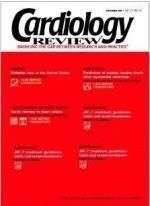Predicting cardiovascular events
This month’s issue features several research reports that focus on using new screening factors to predict cardiovascular events and optimize therapy. In the stroke section, Dr. J. David Curb and associates evaluated the relationship between C-reactive protein (CRP) in 259 stroke cases and 1,348 controls. In his commentary, Dr. Elliott G. Gross agrees with the recommendation to consider CRP as a clinical screening factor.
An article by Drs. Mevan Wijetunga and S. Adam Strickberger in the arrhythmias and conduction disturbances section compared the 1- and 3-year survival rates of 103 patients with nonischemic dilated cardiomyopathy and asymptomatic, nonsustain-ed ventricular tachycardia who were randomized to treatment with amiodarone or an implantable cardioverter-defibrillator. Ten medical centers in the United States participated in the study, which also assessed the cost of medical care and quality of life. Dr. Joseph Dell’Orfano comments on whether drug or device therapy is the better option.
In the combined hypertension and diabetes section, Dr. Nadia Wasi and associates assessed the increase in nocturnal blood pressure observed in 75 diabetic patients and related it to the development of microalbuminuria. Dr. Alton L. Steiner, an endocrine specialist, discusses the clinical implications of this article.
In the heart failure section, Dr. Branislav Radovancevic and colleagues used prolonged corrected QT intervals (an echocardiographic measurement) and a blood test (B-type natriuretic peptide) to help predict mortality in 241 patients with advanced heart failure. Dr. Richard Stewart comments on the usefulness of the findings.
Our final article appears in
the hypertension section. Dr. Roberto Ceravolo and colleagues, from Italy, enrolled 262 hyper-tensive outpatients in a study
to evaluate the relationship
between pulse pressure and
endothelial dysfunction in predicting future adverse cardio-vascular events. Drs. Nobuyuki Miyawaki and John K. Maesaka state that they would like to see more comprehensive studies on these findings.
